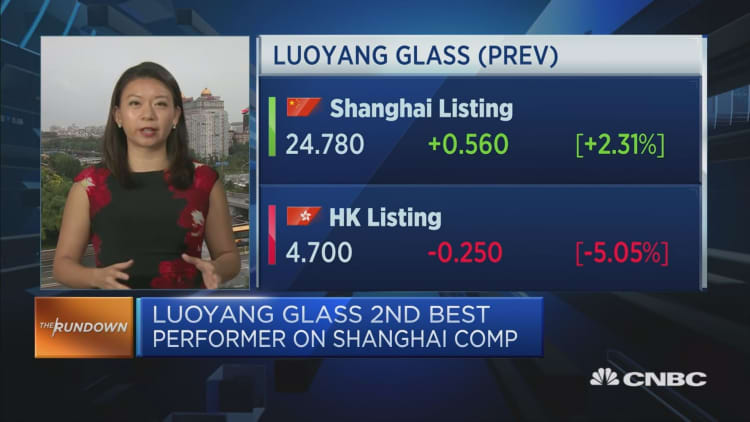
One of China's best-performing stocks this month is a tiny glass company you've never heard of — but nobody seems to know why.
State-owned Luoyang Glass is the best performer in the Shanghai Composite so far this month, up 37 percent as of Wednesday morning. The stock has also hit the 10 percent daily trading limit three times in recent days. The Henan province-based company is rarely more than a blip for investors: Luoyang is worth $1.2 billion, a measly 0.03 percent of the Shanghai Composite's total market cap of more than $4 trillion.
The only thing is, it's unclear why Luoyang's stock is jumping, and even the company says it doesn't know why.
Late Monday, the firm issued a statement telling investors to proceed with caution and to consider fundamentals. The company even warned of weak profitability, just a few days before it's due to report first-half results.
Luoyang, which makes products like sheet and float glass, has alternated annually between profits and losses over the last few years. It's not even a company that many analysts follow: Only one has issued a rating for the company, according to Reuters data.
Still, the recent moves fit into a common pattern in China.
"Retail investors still prefer smaller companies because the momentum for those smaller caps tends to be stronger," said Tony Li, an analyst with China Galaxy International Securities.
Smaller companies with lower market values might mean higher volatility, but that can also translate to better profitability and returns, especially as investors look for creative investment themes in China, Li added.
The relatively tiny glass company's unexplained move is certainly a reminder that China's volatile markets are still ironing out some kinks. Regulators have been working over time since a massive crash in 2015 wiped out trillions in market value. Some people were even arrested in the aftermath as the government tried to show it was serious about protecting investors and fighting market manipulation.
More recently, the Shanghai Stock Exchange has taken on more oversight responsibilities, looking into any corporate actions that may pose financial risks.
Last month, Chinese stocks posted a mini-crash dubbed "Black Monday." That day, the Shanghai Composite closed down 1.4 percent, which was its worst performance in months, but nowhere near the sheer drops investors saw two years ago.
Experts say all signs are pointing to a market that is starting to mature — albeit a bit slowly.
"The A-share market has gotten a lot more rational, and there are more growth-oriented equity proxies than in the Hong Kong market," said Nomura's head of China equity research and chief strategist Wendy Liu, referring to another name for stocks traded on the mainland. "I sense that sentiment toward investing in China has continued to warm up."
Foreign institutional investors, for instance, are growing less wary of China exposure now, Liu said.
It's also clear that retail investors in China have a louder voice than ever. In May, online investor criticism of China's securities regulator mounted as equity markets slumped, noted Christopher Beddor of Eurasia Group.
"Retail investors demanded that the regulator avert a 'stock market crisis 4.0' by reducing the number of IPO approvals," he wrote in a recent note. The regulator eventually caved, slashing the number of new approvals per week to four to eight, down from 10.
In the long run, experts say China's markets are set to become far less bumpy. But for now, some stocks are still going to experience dramatic swings, even if they're influenced by tangential information.
It's possible, for example, that Luoyang's recent gains might be driven by news from giant state-owned telecom China Unicom's announcement last Wednesday that it was pursuing a mixed ownership scheme. Beijing has been busy trying to overhaul its state-owned enterprises, long considered a drag to economic growth. Luoyang itself has a restructuring plan in the works awaiting approval from authorities.
Luoyang is expected to post its first half earnings at the end of the month. The company is also traded in Hong Kong, and those shares are up more than 11 percent so far in August.
But when it comes to these kinds of moves in China, "generally, it is difficult to figure out the specific logic [or] reasoning on a single stock," said Liu.


